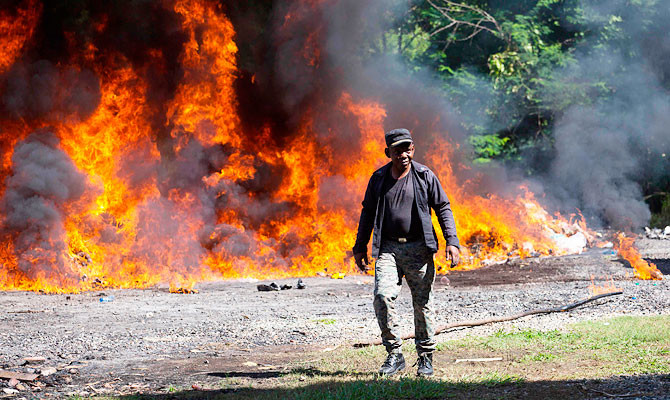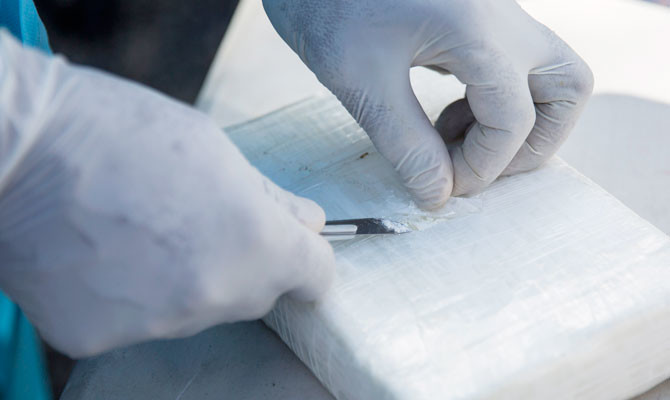LISBON: New gangs are muscling into cocaine markets in Europe, setting up smuggling networks straight from producers in Latin America to consumers, a business which used to be dominated by the mafia, the Lisbon-based EU drugs agency said on Thursday.
In a study, which aimed to identify the causes of surging amounts of cocaine smuggled into Europe, the agency found that new gangs from the Balkans, Morocco and elsewhere were joining Italy’s mafia to supply Europe’s most popular stimulant drug.
Rising supplies of purer cocaine to Europe is mainly the result of growing production in Latin America, especially by the biggest producer, Colombia.
That has led to growing numbers of gangs setting up their own smuggling lines straight from producers, which has kept cocaine prices lower. New gangs now include Moroccans, who use their established smuggling routes for cannabis.
“The fragmentation of the cocaine trade in Europe appears to have resulted in increased competition among crime gangs for national and cross-border territories in cocaine supply and retail,” the report said. “One of the consequences has been an increase in violence and drug-related homicides.”
The emergence of more gangs has led to new marketing and transport methods, such as by couriers who dispatch the cocaine to consumers who contact special, dedicated call centers.
Such courier services exist in Britain, France and Belgium, where buyers get in touch with call centers located in Spain or the western Balkans, the report said.
“These new methods, reflecting an ‘Uberization’ of the cocaine trade, are clear signs of a competitive market in which sellers have to promote additional services beyond the product itself, such as fast delivery anywhere at any time,” it said.
The increasing supply of cocaine in Europe has coincided in the past few years with changes in traditional smuggling routes from Iberia to large ports in Belgium, France and Germany.
The port of Antwerp is now the single, biggest entry point for cocaine into Europe, with 41 tons seized in 2017. In 2016 70.9 tons of the drug was seized in all in Europe.
The report warned that the new smuggling routes through ports “may represent only the tip of the iceberg, as other routes and trafficking modes, such as private aviation, may simply go undetected.”
Cocaine surge to Europe fueled by new gangs, violence-report
Cocaine surge to Europe fueled by new gangs, violence-report

- The emergence of more gangs has led to new marketing and transport methods, such as by couriers who dispatch the cocaine to consumers who contact special, dedicated call centers
Rubio says technical talks with Denmark, Greenland officials over Arctic security have begun

- US Secretary of State on Wednesday appeared eager to downplay Trump’s rift with Europe over Greenland
WASHINGTON: Technical talks between the US, Denmark and Greenland over hatching an Arctic security deal are now underway, Secretary of State Marco Rubio said on Wednesday.
The foreign ministers of Denmark and Greenland agreed to create a working group aimed at addressing differences with the US during a Washington meeting earlier this month with Vice President JD Vance and Rubio.
The group was created after President Donald Trump’s repeated calls for the US to take over Greenland, a Danish territory, in the name of countering threats from Russia and China — calls that Greenland, Denmark and European allies forcefully rejected.
“It begins today and it will be a regular process,” Rubio said of the working group, as he testified before the Senate Foreign Relations Committee. “We’re going to try to do it in a way that isn’t like a media circus every time these conversations happen, because we think that creates more flexibility on both sides to arrive at a positive outcome.”
The Danish Foreign Ministry said Wednesday’s talks focused on “how we can address US concerns about security in the Arctic while respecting the red lines of the Kingdom.” Red lines refers to the sovereignty of Greenland.
Trump’s renewed threats in recent weeks to annex Greenland, which is a semiautonomous territory of a NATO ally, has roiled US-European relations.
Trump this month announced he would slap new tariffs on Denmark and seven other European countries that opposed his takeover calls, only to abruptly drop his threats after a “framework” for a deal over access to the mineral-rich island was reached, with NATO Secretary-General Mark Rutte’s help. Few details of the agreement have emerged.
After stiff pushback from European allies to his Greenland rhetoric, Trump also announced at the World Economic Forum in Davos, Switzerland, last week that he would take off the table the possibility of using American military force to acquire Greenland.
The president backed off his tariff threats and softened his language after Wall Street suffered its biggest losses in months over concerns that Trump’s Greenland ambitions could spur a trade war and fundamentally rupture NATO, a 32-member transatlantic military alliance that’s been a linchpin of post-World War II security.
Rubio on Wednesday appeared eager to downplay Trump’s rift with Europe over Greenland.
“We’ve got a little bit of work to do, but I think we’re going to wind up in a good place, and I think you’ll hear the same from our colleagues in Europe very shortly,” Rubio said.
Rubio during Wednesday’s hearing also had a pointed exchange with Sen. Tim Kaine, D-Virginia, about Trump repeatedly referring to Greenland as Iceland while at Davos.
“Yeah, he meant to say Greenland, but I think we’re all familiar with presidents that have verbal stumbles,” Rubio said in responding to Kaine’s questions about Trump’s flub — taking a veiled dig at former President Joe Biden. “We’ve had presidents like that before. Some made a lot more than this one.”












